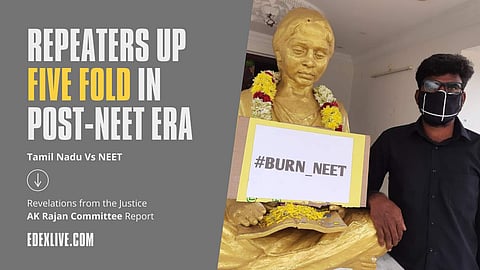

The share of repeating students from Tamil Nadu in the National Eligibility cum Entrance Test (Undergraduate) or NEET has increased 4.7 times since NEET has been implemented, said the High-Level Committee headed by Justice AK Rajan which has studied the impact of NEET on medical admissions in Tamil Nadu.
The report termed "students who repeatedly appear for the NEET exams consequently until they succeed in getting admission to MBBS" as repeaters. "Also, they undergo NEET coaching from Class 11, sometimes from Class 8, for several years, along with school academics in private coaching centres or extra-hours in Special Schools for NEET or as a part of extra coaching in the schools they study. This means the repeaters and coaching-goers are inseparable, both are one and the same. For convenience, the data labels them as "current year students" (First timers) and "other than current year students‟ (Repeaters)," read the report.
In 2016-17, the last year of non-NEET entrances and admissions, only 12.47 per cent of all the students were repeaters. The rest were all current students. But four years down the line, the roles have reversed. Current students are a minority now with just 28.58 per cent while the rest of the 71.42 per cent are repeaters. That's a 472 per cent rise in the share of repeaters. "This trend is alarming that except those students who are in urban areas, studied in English-medium (schools or) in private schools, and whose parents are educated with high-income levels, can only get a meagre share in the admission as they cannot afford to go for an expensive coaching affair," said the report.
The report also comments on the "mushrooming" NEET coaching centres. "The economics of NEET coaching classes is staggering, with the cost to a student in a popular centre in Rajasthan, for example, amounting to at least Rs 5 lakh for higher secondary education and entrance coaching classes. Historically, it is evident that competitive exams revolve around the coaching class ecosystem, which, thus have grown around JEE and NEET in India," it said and added that Tamil Nadu has seen branches of "every key coaching institute opening shop in major cities and affluent rural areas in the wake of the compulsory implementation of NEET in 2016". The report added that this has eventually led to an increase in coaching institutes operating under the "legal shell of a school".
The report also shows that 99 per cent of the students who were admitted in the year 2019-20 had received special training before NEET. Most of them are repeaters as well, said the report, emphasising their point. "Rural students studying in Government Schools coming from economically weaker section find it difficult to join the coaching centres in the cities where the fees are high and the boarding facilities are also not affordable. Especially, poor students from rural backgrounds and those who have studied in the vernacular medium face great disadvantage, because of the trespassing coachers encroaching education. Comparatively, students studying in State Board/CBSE/ICSE syllabus in the cities have easier access to join coaching centres in the cities where transportation facilities are available compared to the rural areas," said the report.
The report also said that coaching has now replaced learning, and medical aspirants, have started ignoring schooling and favour coaching. "As opposed to schooling, they linger around the coaching centres in various manners including short term, long term and
crash courses based on their needs," said the report as it listed various 'packages' of coaching offered by the popular coaching centres, and with respective fee structures. "As far as our review is concerned there are more than 400 active coaching centres in Tamil Nadu," it added.
The fees for a one-month crash course varies between Rs 10,000 to Rs 38,000, for one year (short term), it is Rs 30,000 to Rs 1,50,000, and for four years (long term) it is Rs 2,50,000 to Rs 4,50,000. Based on this and the data of the repeaters, the average cost of coaching of a student arrived at Rs 95,033 and thus the average annual income of a Centre per year was Rs 13,95,32,202. Collectively, the total business of 400 plus coaching firms in Tamil Nadu is approximately Rs 5750 crore, exclusively incurred on NEET. The actual figure would be higher than this if a detailed investigation is made on this issue," said the AK Rajan report.
The committee said that it found it surprising that the actual fee (excluding the capitation or illegal surcharges levied by the private colleges) paid by the medical students for their studies to the medical colleges — both government and private — would be much less than the money spent on coaching. "To conclude, coaching dependent entrance examinations like NEET will only help those who "have" against the "have-not" and those who can "access" against those who "cannot access‟, but whoever comes out successful out of this will have only test-taking skills rather than highest levels of reasoning, analytical and psychosocial skills that are very much essential to study medicine. Such essential skills cannot be imparted through coaching but only through learning under a proper schooling system," read the report.
The report by the Tamil Nadu government's high-level committee headed by retired Judge AK Rajan on the impact of NEET in medical admissions in Tamil Nadu was made public on September 20. The 165-page report, which was submitted on July 14 criticises NEET and seeks its immediate ban in Tamil Nadu.
At the same time, Dr G R Ravindranath, General Secretary, Doctors' Association for Social Equality and a member of the committee said that NEET is totally against the students from Tamil Nadu and that the centre should work along with the state to ban it completely. "The centre has to agree to this demand and must amend its NMC bill to facilitate the ban of NEET in Tamil Nadu. Additionally, there must be a provision for states that are against the examination to raise their voice," he said.
